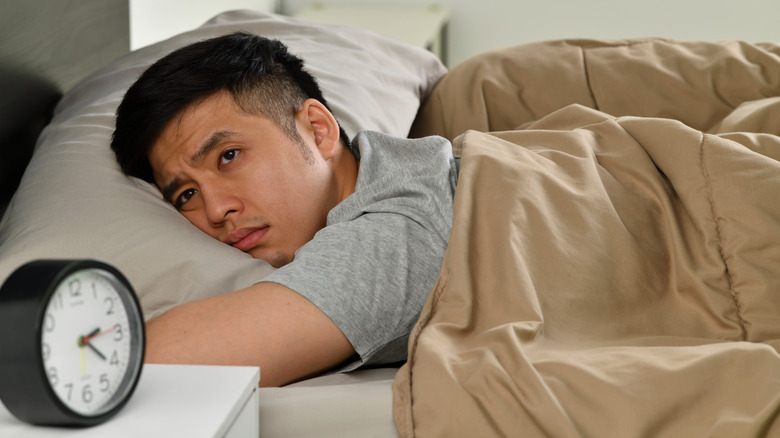What Weighted Blankets Do To The Body To Promote A Good Night's Sleep
Whether or not you believe getting eight hours a night is necessary, everyone can agree not getting enough sleep is terrible. A recent finding sheds some critical light on an existing sleep-promoting tool.
After all, 35% of adults don't get enough sleep, and a lack of sleep can negatively affect almost every aspect of your health (via Healthline). There are many sleep aids and therapies, from counting sheep to taking oral supplements, but they don't all work the same for everyone, and many cost money. If they always worked or only required a single purchase, then the cost could be worth it, but unfortunately, that isn't the case. Another problem when it comes to supplements and prescriptions is side effects. According to WebMD, despite being prescribed by a doctor, there are many possible side effects when taking sleeping pills, and you don't know if they will occur until you take them.
The weighted blanket is one sleeping method that doesn't require you to purchase refills, take anything orally, or deal with side effects (via U.S. News & World Report). Weighted blankets are heavy blankets with evenly distributed weights sewn into them. The added weight wraps around the sleeper and comforts them like another person holding them. This heavy hugging feeling can help reduce anxiety and ease chronic pain symptoms, which in turn can help improve sleep. Though there isn't much research on how weighted blankets work besides the physical humanlike comforting factor, a new finding has revealed more.
Weighted blankets increase melatonin
Melatonin is a hormone made in the body that affects sleep, which is released based on the time of day (per Mayo Clinic). Levels increase when it's dark and decrease when it's light, and play a role in the body going to sleep or waking up. Melatonin supplements are used to treat sleep troubles by reducing the time it takes to fall asleep or as a supplement, for those with decreased levels, such as older adults. However, they have side effects, like nausea and headaches, and can interfere with diabetes medication, anticoagulants, and other drugs.
A recent study published in the Journal of Sleep Research has shown that weighted blankets can naturally increase melatonin levels. The study involved healthy young participants without insomnia. Experts made comparisons of weighted and regular blankets, melatonin testing, sleepiness, and sleep duration testing. Unfortunately, the test did not show significantly greater sleepiness or sleep duration between regular and weighted blankets. The study did reveal, though, that those using a weighted blanket had greater increases in melatonin after a few hours of sleeping when tested from 10 to 11 p.m. So what does this mean?
Discovering that weighted blankets can increase melatonin could eventually be applied to those who would try or be prescribed melatonin supplements for relief. They could benefit from using a weighted blanket to help them sleep or to manage anxiety rather than take a pill.


